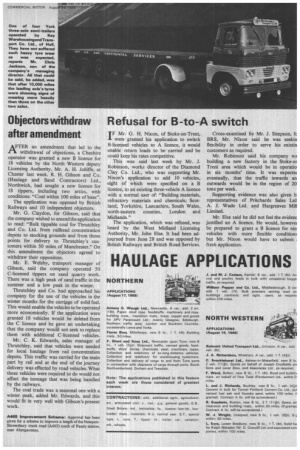TF Mr. G. H. Nixon, of Stoke-on-Trent, were granted his
Page 35

If you've noticed an error in this article please click here to report it so we can fix it.
application to switch B-licensed vehicles to A licence, it would enable return loads to be carried and he could keep his rates competitive.
This was said last week by Mr. J. Robinson, works director of the Diamond Clay Co. Ltd., who was supporting Mr. Nixon's application to add 10 vehicles, eight of which were specified on a B licence, to an existing three-vehicle A licence with a normal user of: "Building materials, refractory materials and chemicals; Scotland, Yorkshire, Lancashire, South Wales, north-eastern counties, London and Midlands."
The application, which was refused, was heard by the West Midland Licensing Authority, Mr. John Else. It had been adjourned from June 28 and was opposed by British Railways and British Road Services. Cross-examined by Mr. J. Simpson, fc BRS, Mr. Nixon said he was seekin flexibility in order to serve his existin customers as required.
Mr. Robinson said his company wa building a new factory in the Stoke-or Trent area which would be in operatio in six months' time. It was expecte( eventually, that the traffic inwards an outwards would be in the region of 20 tons per week.
Supporting evidence was also given b representatives of Pritchards Sales Ltd A. J. Wade Ltd. and Hargreaves Mill Limited.
Mr. Else said he did not feel the evidenc justified an A licence. He would, howevet be prepared to grant a B licence for nun vehicles with more flexible conditionE but Mr. Nixon would have to submit . fresh application.




















































































































